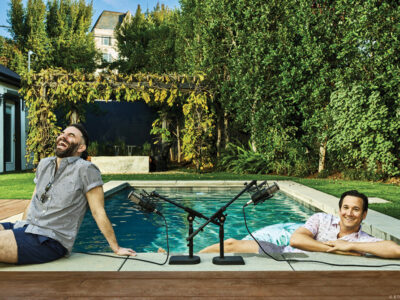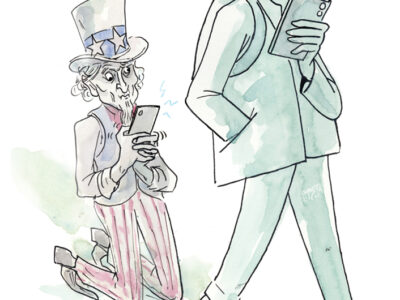
A pro comic shares his secrets.
By Shaun Eli Breidbart | “The DEA is reporting that New Jersey’s heroin is the purest in the country. It’s 71 percent pure. That’s gotta be at least a bit embarrassing, don’t you think, when your heroin is cleaner than your drinking water?”
Surprisingly, that joke does as well in New Jersey as it does in New York. More surprisingly, sometimes people in New Jersey applaud the set-up before I even get to the punchline.
Everyone wants to have a great sense of humor. But how do you make people laugh if it doesn’t come naturally to you?
Some people are good at telling jokes; others aren’t. But like most skills, making people laugh is a talent that we all can develop.
Starting out to tell a joke you already have one advantage over a professional comedian. That’s right, an advantage. You know your audience. They’re your friends, your family, your co-workers. You, unlike a working comic, don’t have to consider for every joke what demographic groups will laugh, who won’t like the joke, who won’t understand it, and who might be so offended they’ll tune out the rest of what you have to say. You probably know the education, political leanings, religion, and sensibilities of your audience.
Starting out, you’re one step ahead.
That said, not all jokes work for all people. If a fat person tells a fat joke and gets a laugh it doesn’t mean that you’ll get the same reaction if you have 8 percent body fat and your audience is … well, I have less than 20 percent body fat so I’ll omit the joke I wanted to put here.
In a comedy club the MC starts by warming up the audience. He may ask where people are from, or what they do for a living. While his banter may seem spontaneous, do you really think he’s never had a Southerner or Midwesterner or German, a trucker or farmer or prison guard in the audience before? He’s making them feel part of the show and getting them ready to laugh. But you’ll never hear him say, “I have this joke for you.” A comedian doesn’t need a segue, just a pause before moving onto the next joke.
In house painting, preparation is so important that workers spend more time covering what they don’t want to paint than they do with the brush or roller. A golfer spends more time lining up a shot than it takes to swing the club. In comedy, the premise, which sets up the joke, is critical. Don’t rush. Even Johnny Carson used to say that when he got back from a vacation he had to remind himself to slow down. At the same time, extra words just get in the way. So keep it short. And if you can, finish right on the punch line. That means the surprise comes at the end of the sentence. For example: “A man in Northern California claims he’s invented a device that will tell you whether your toilet seat is up or down. Didn’t a man in New Jersey already invent this? I think he called it the light bulb” is funnier than “A man in Northern California claims he’s invented a device that will tell you whether your toilet seat is up or down. But didn’t Thomas Edison invent the light bulb a hundred years ago?”
Word the joke so that when you’re finished, you stop talking. As soon as they get the joke, they start laughing. Don’t step on your laughter.
The three most important words to know in preparing to tell a joke are: Practice, Practice, Practice. Don’t be shy about spending an hour or two in front of a video camera to prepare a one-minute joke. Nobody has to know. Watch your face, your hands. Listen to your pacing. And watch your expression, because if you don’t look happy telling the joke, they won’t be happy to hear it.
For the first five-minute routine I ever performed, I said it out loud over a hundred times so I would know it word for word. Nothing is worse than hearing half a joke, then having the joke-teller say something like, “Oh, wait, I forgot to tell you that the minister was a woman, and the hair stylist was her son.” You have to know the joke well enough to be able to tell it correctly the first time you have an audience. And practice it out loud. Some things look good on paper and sound fine in your head, but they are tongue-twisters. At my first audition at The Comic Strip in New York, my first punch line—to a joke I’d told only a few times before but that had been working very well for me the previous week—ended with the words “heroin addict.” To say them clearly requires moving the mouth in a lot of different directions. Under pressure, I got tongue-tied. I quickly corrected myself and didn’t lose the audience, but I lost the auditioner.
Don’t oversell your joke. Starting with “This is the funniest thing I’ve ever heard” sets up expectations that will be hard to meet. But you yourself have to have confidence that the joke is funny. And you know it is—because it already made you laugh enough that you want to repeat it.
Usually a believable premise is easier to sell. I had to cut a joke I really liked because it was based on my car getting a sexually transmitted disease, and there are limits to how much you can make people laugh when you start off with something unrealistic. But don’t start with “This really happened to me” or “This is a true story,” because as soon as you say that, they’ll start to doubt you. You want your audience following, not judging.
And if after you tell your killer joke someone says, “Yeah, I’ve already heard that one,” take this as a sign you should think about writing your own material instead of just repeating what you’ve heard. The more jokes you tell, the more that other people will want to tell you jokes. That’s great for amateurs; it’s not so good for professionals. Please don’t tell us that some joke you heard is perfect for us. It’s not. Somebody else has already written it and has been telling it. We’re paid to perform original material.
Because comedy club audiences are paying to be entertained, most professional comedians won’t go more than a few sentences without some sort of laugh line as they build to a big finish. Telling a joke to your friends doesn’t come with that same kind of pressure. They’ll sit and wait a minute or more if they know you’re building to a punch line. But they have to know you’re telling a joke. If you begin a conversation with “This afternoon when I was shopping for underwear at Sears …” and they don’t know you’re starting a joke, it’s likely you’ll be interrupted, so you may have to telegraph that it’s a funny story. Of course if you can begin with “This afternoon when I was shopping for underwear at McDonald’s,” they’ll probably figure it out. Unfortunately you’re still stuck with a burden that a professional comedian won’t have, because the pro’s job comes with a microphone, lighting that makes him the center of attention, and an audience expecting to be entertained.
And note that while some jokes are funnier to read, others are funnier when you hear them, such as the New Jersey joke at the top of this article. Some, like slapstick movies, have to be seen. Other jokes need to be both verbal and visual. Get out that video camera and keep practicing. But if after all this you still can’t tell a joke and people ask you to make them laugh, take them to a comedy club.
Shaun Eli Breidbart W’83 is a stand-up comedian and comedy writer. You can learn more about him, read material he’s written for late-night television, read his comedic essays and find his performance schedule on the comedy website www.BrainChampagne.com.




